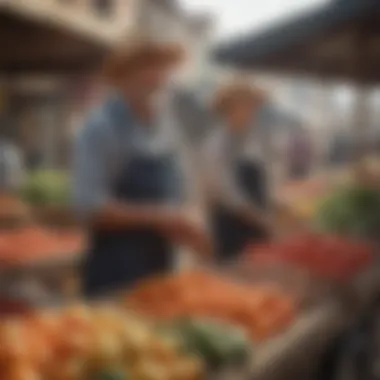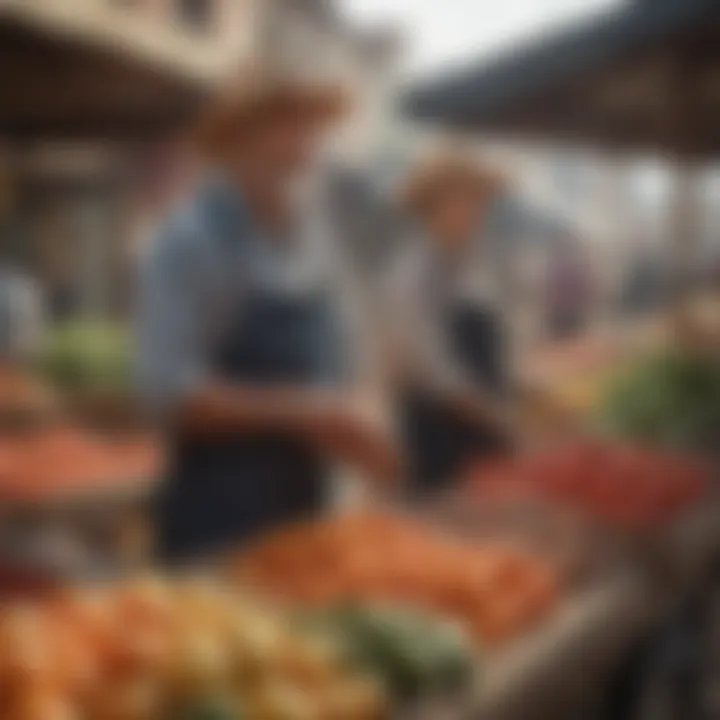Benefits and Accessibility of Senior Farmers Market Coupons


Intro
As the sun rises over quaint farmers markets, it brings forth not just fresh produce but also vital programs aimed at enhancing access to healthy foods for our aging population. Among these beneficial initiatives are the senior farmers market coupons. These coupons hold the potential to transform what could be a limited dietary experience into a vibrant array of fresh fruits and vegetables. By looking at how these programs work and their significant impact, we can gain a clearer understanding of their role in our communities.
The aim of this article is to shed light on how senior farmers market coupons benefit the elderly, bolster local economies, and foster healthier eating habits. But there’s more lurking beneath the surface. Challenges in accessibility and awareness often plague these programs. Hence, a detailed exploration is in order to navigate this multifaceted topic and comprehend how to make these valuable resources more accessible for those who need them most.
Current Trends in Agriculture and Horticulture
Recent years have experienced a noticeable shift towards more sustainable and community-focused practices in agriculture. The push towards local sourcing has created an atmosphere that’s conducive to programs like senior farmers market coupons.
Overview of Recent Innovations
Several innovations are now gracing the list of current agricultural trends. From vertical farming techniques that maximize space to organic practices that eschew harmful pesticides, the agriculture sector is becoming more responsive to health and environmental concerns. For instance, small-scale urban farms have emerged, providing not just fresh produce but also educational programs targeting seniors to help them understand healthy eating options. This makes them prime participants in the farmers market ecosystem.
Sustainable Practices Gaining Popularity
Sustainability isn’t just a buzzword anymore; it’s become a practice. Many farmers are now adopting ways to reduce waste and improve soil health while also thinking about how to reach vulnerable populations, such as the elderly. On-site composting, crop rotation, and even community-supported agriculture models are gaining traction. These practices not only ensure the land remains productive but also foster a sense of community—something essential for incorporating programs like farmers market coupons successfully.
Benefits of Senior Farmers Market Coupons
The core essence of senior farmers market coupons lies in their benefits. These coupons are a lifeline for many seniors, offering them a chance to eat better and save money.
Enhancing Nutritional Access
What’s the first thing that flies out the window when people are strapped for cash? The food budget. This is where the coupons shine. These vouchers make it easier for seniors to buy fresh produce, thus enhancing their overall nutrition. It is a win-win situation, as elderly individuals leverage the coupons, while local vendors experience a boost in sales.
Economic Impact
When seniors actively engage with farmers markets using their coupons, local economies feel the ripple effect. Increased foot traffic not only aids farmers but also spurs nearby businesses, creating a holistic economic uplift. According to local reports, farmers markets with dedicated coupon programs often see a rise in overall sales, benefiting all involved.
Challenges with Accessibility
Despite their potential, these coupon programs face significant barriers that cannot be ignored. Factors like transportation, awareness, and even market hours can make access challenging for seniors.
Transportation Dilemmas
Getting to a market can be a hurdle. Public transportation options might be limited or non-existent, leading seniors to miss out on the benefits. Solutions could involve community volunteer groups offering rides or partnerships with local organizations.
Awareness Gaps
Even if the programs exist, many are simply unaware. Raising awareness is vital, and utilizing community centers, local newsletters, and social media may help in spreading the word about available resources.
"To attend a farmers market is to witness the very pulse of the community, yet without awareness, many seniors remain disconnected from its life-giving bounty."
Finale
In order to maximize the potential of senior farmers market coupons, both innovation and outreach are necessary. Watching how markets adapt to meet the needs of elderly customers will be a test of community spirit and resilience. Fostering dialogue around these issues can open up channels for dialogue that will enhance participation and strengthen the fabric of local economies. Ultimately, it is about creating a supportive environment where every generation can reap the benefits of fresh, healthy food.
Defining the Concept of Senior Farmers Market Coupons
Senior Farmers Market Coupons are more than just pieces of paper; they're a bridge between the elderly community and fresh produce. These coupons serve essential purposes, from alleviating food insecurity to promoting wellness among older adults. At their core, they aim to empower seniors by enhancing their purchasing power in farmers markets, which can significantly impact their quality of life.
Engaging with these programs allows seniors to access fresher options, supporting not just their health but also local agriculture—a true win-win situation. Let’s delve deeper into their significance and the criteria determining eligibility for these valuable coupons.
Understanding the Purpose
The main mission behind Senior Farmers Market Coupons is straightforward: give seniors a means to buy fresh, nutritious food. This is particularly crucial for individuals on a fixed income, where budgeting becomes an intricate balancing act. Many older adults may find it hard to afford the rising prices of healthy food. These coupons tackle that issue head-on. Furthermore, the program encourages a much-needed shift towards healthier eating habits. With an option to purchase items like fruits and vegetables, many seniors may find themselves opting for nutritious alternatives over processed foods.
Additionally, coupons facilitate social interaction and community engagement. Visiting farmers markets does not merely serve a functional purpose; it fosters a social atmosphere. Seniors can mingle, share recipes, and build a sense of community, which is often as essential to well-being as physical nutrition. More than just stimulating personal well-being, it uplifts the local economy and educates about sustainable agriculture practices.
Eligibility Criteria
To partake in Senior Farmers Market Coupons, one must adhere to specific eligibility criteria, which ensure that assistance is directed towards those who need it most. Typically, seniors must be:


- Aged 60 or older: Most programs set this as the baseline age to qualify.
- Residing within the state: Programs usually require applicants to be residents of the state offering the coupons.
- Meet certain income guidelines: These thresholds vary by state but generally align with the federal poverty level. For instance, a household of one may be eligible if their income is below around $23,000 annually.
This direct link to income is paramount, ensuring the program targets those experiencing financial constraints. By focusing on seniors who are economically disadvantaged, these coupons strategically address food insecurity, enabling older adults to make healthier choices without breaking the bank.
In summary, understanding the purpose and eligibility criteria for Senior Farmers Market Coupons is crucial for both potential users and advocates. These essential components set the stage for the broader discussions about how these programs sustain not only individuals but also local agriculture.
Economic Impact on Local Farmers
The significance of senior farmers market coupons extends far beyond aiding the elderly. These initiatives can create ripples of economic benefits that enhance the agricultural landscape, which is crucial for vibrant communities. When seniors gain access to these coupons, especially when purchasing fresh produce from local markets, it not only supports the health of our older population but also bolsters local farmers economically.
Increased Revenue Opportunities
Local farmers often find their sales surging as seniors redeem their market coupons. Each coupon represents a direct financial benefit, converting potential shoppers into eager buyers. As veterans of their trade, farmers understand the value of a steady flow of customers. With an increase in coupon use, farmers markets can cultivate an atmosphere of vitality, fostering an environment where goods are exchanged with a relevance that resonates.
Imagine a farmer, let’s call him Samuel. Every Saturday morning, he sets up his stall at the local market, arranging juicy tomatoes, crisp greens, and vibrant peppers. With the introduction of senior coupons, Samuel sees a notable uptick in sales. Seniors, equipped with these coupons, are drawn to his fresh offerings. It’s not just revenue; it’s a chance for deeper community engagement. Many farmers establish loyal relationships with customers, learning their names and preferences. The coupon system for seniors transforms a mere transaction into a valued interaction that keeps consumers coming back.
- Revenue Surges: Farms that participate in the coupon systems often observe increased revenue, leading to
- Expanded product offerings
- Ability to hire more workers
- Overall economic growth in the community
Beyond the immediate sales, senior farmers market coupons facilitate a new cycle of economic activity. The farmers re-invest their earnings into their operations. Vendors can purchase new equipment or expand their fields, indirectly stimulating growth across neighboring businesses. For instance, they might buy seeds from a local supply store or truck maintenance from a nearby mechanic. Every buck spent has a traceable impact on local economies.
Supporting Sustainable Practices
Another profound economic impact of senior farmers market coupons revolves around the promotion of sustainable farming practices. When farmers know that they have a consistent customer base from coupon use, they can adopt more sustainable methods without the fear of losing revenue. Participation in coupon programs encourages producers to shift their operations toward more regenerative farming approaches.
This paradigm shift might lead farmers to cultivate heirloom varieties or organic produce, which, while often more labor-intensive, creates a market for quality that resonates with health-conscious seniors. By providing the financial means through coupons for seniors, this program encourages farmers to grow not just for profit but for purpose.
- Benefits of Sustainable Practices:
- Enhanced soil health
- Reduced chemical usage
- Long-term viability for future generations of farmers
Farmers can thus become stewards of the land, balancing both economic and environmental needs. When consumers, especially seniors who often prioritize health, show a preference for local, sustainable options, it creates a feedback loop that incentivizes farmers to maintain their practices. This dynamic strengthens community bonds and cultivates an environmentally aware consumer base that advocates for local agriculture.
"The local farmers market is more than just a place to buy food; it’s where economics meet community spirit, and senior coupons are the threads that weave it all together."
This synergy is powerful—coupons for seniors create a demand that supports not only the present economic landscape but also the sustainability of agriculture for years to come.
Promoting Healthy Eating Habits
Promoting healthy eating habits among seniors is a cornerstone of ensuring their well-being and longevity. With age comes a multitude of health challenges that can be mitigated or even avoided through proper nutrition. Senior farmers market coupons serve as a gateway, enabling older adults to access fresh and nutritious produce while also fostering a more profound relationship with food.
Older adults often face dietary restrictions due to medical conditions such as diabetes or hypertension. Thus, having access to fresh fruits and vegetables allows them to create meals that support their health requirements. These coupons are not just about seeing discounts; they represent a chance for seniors to enrich their diets with colorful, fresh ingredients. A win-win if you want my opinion!
Access to Fresh Produce
When we talk about access to fresh produce, we're really talking about more than just food; it’s about dignity and choice. Seniors, particularly those on fixed incomes, may find their grocery shopping limited to cheaper, processed options due to financial constraints. This can lead to poorer dietary choices and health outcomes.
Senior farmers market coupons help bridge this gap by providing financial assistance that encourages purchasing fresh produce. Many local markets have happily embraced these initiatives, offering a variety of goods—from juicy tomatoes and crisp lettuce to delightful berries. Having fresh produce readily available can transform a meal from a mundane necessity into a colorful feast.
- Convenience: Local farmers markets are typically situated within communities, making them easier to access compared to larger grocery stores.
- Variety: Farmers markets often feature seasonal produce that isn’t always available at chain grocers, providing unique flavors and textures for senior diets.
- Social Interaction: Visiting a local market gives elderly individuals a chance to mingle and engage with local growers, providing social benefits that contribute to mental well-being.
Nutritional Benefits for Seniors
The nutritional advantages that come with food sourced directly from farmers markets cannot be overstated, especially for seniors. Here’s why these benefits are critical:
- Nutrient Density: Fresh produce is often packed with essential vitamins and minerals necessary for maintaining good health. For instance, leafy greens like kale are rich in vitamins A, C, and K, all of which support immune function, bone health, and overall vitality.
- Lower Sodium Options: Many processed foods contain high levels of sodium, which can lead to increased blood pressure. Fresh foods give seniors the option to manage sodium intake effectively.
- Bioactive Compounds: Foods like berries and peppers contain natural compounds that have been shown to reduce inflammation and boost heart health—an important consideration for older adults!
- Improved Digestion: Increased fiber intake from fresh fruits and vegetables is essential for digestive health, which can often decline with age.
Older adults should be encouraged to explore the variety of produce available to them. Small changes—like substituting processed snacks with fresh fruits—can lead to significant health improvements.
Access to fresh produce through farmers market coupons not only supports immediate dietary needs but also promotes long-term health benefits for seniors.
Government Programs Supporting Coupon Initiatives
The significance of government programs in promoting senior farmers market coupons cannot be overstated. These initiatives not only provide critical financial support to seniors in need, but they also encourage participation in local farmers markets, which can benefit both the elderly and local economies. By understanding the relationship between these programs and the accessibility of coupons, we can better appreciate how policy decisions influence the well-being of senior citizens.


Federal and State-Level Programs
At the federal level, the U.S. government has implemented several key initiatives aimed at enhancing the accessibility of fresh produce for seniors. A prominent example is the Senior Farmers' Market Nutrition Program (SFMNP). This program provides low-income seniors with coupons that can be used at farmers markets and roadside stands. The intent is clear: to bolster healthy eating while also supporting local agriculture.
State programs often complement federal efforts by customizing initiatives to fit the specific needs of local communities. For instance, some states have established their own farmers market voucher programs that work in tandem with SFMNP, allowing seniors to use both forms of aid. This dual approach can significantly widen the array of eligible products, making fresh, nutritious options more accessible.
“These initiatives highlight how government involvement can help bridge the gap between community resources and the needs of vulnerable populations.”
Interaction with Food Assistance Programs
The intersection of senior farmers market coupon programs and food assistance initiatives presents another layer of complexity and opportunity. Programs like the Supplemental Nutrition Assistance Program (SNAP) offer low-income households the ability to purchase food, including at farmers markets, yet many eligible seniors might not be aware of how these systems can work together.
Training and outreach are essential in making sure seniors understand how to utilize these coupons alongside their SNAP benefits. By integrating these resources, seniors can access an even greater variety of fresh produce. Furthermore, some markets facilitate programs where SNAP participants can convert their benefits into double value at the market, allowing for an even more attainable connection to local food sources.
- Such innovative programs not only increase food security but also foster stronger community ties by connecting seniors with local farmers.
- Educating seniors about their options can significantly enhance participation rates and maximize the benefits available to them.
Investigating the nuts and bolts of these interactions helps illuminate the multifaceted role government programs play in the broader ecosystem of food accessibility for our seniors. Ultimately, effective coordination between programs leads to healthier outcomes for elderly populations and boosts the local economy at the same time.
Accessibility Challenges for Seniors
Understanding accessibility challenges for seniors is crucial as it delves into the barriers that can impede their participation in farmers markets and hinder them from reaping the benefits offered by senior farmers market coupons. These obstacles not only affect their ability to access fresh, nutritious food but also touch on their overall well-being and community involvement. Addressing these challenges is essential for creating an inclusive environment where all seniors can engage fully and take advantage of local resources.
Mobility Issues
Mobility concerns stand as a significant hurdle for many seniors. As individuals age, physical limitations often arise, leading to difficulties in getting around. This can manifest in various ways, such as reduced strength, balance issues, or chronic conditions like arthritis or joint pain. A senior who used to walk five blocks with ease may find themselves struggling to navigate such distances, particularly if farmers markets are located far from their homes.
To mitigate these mobility problems, farmers markets need to consider several strategies. For example, designated parking areas close to market entrances can be beneficial. Additionally, markets could offer transportation solutions, like partnerships with local ride-sharing services or community shuttles catering specifically to seniors.
Furthermore, physical infrastructure should be examined. Ramps and smooth pathways between stalls could vastly improve navigation for individuals using walkers or wheelchairs. Prioritizing these changes not only enhances accessibility but also fosters a welcoming atmosphere for the elderly, encouraging them to participate in local market activities.
Digital Divide
In today's tech-driven world, the digital divide presents another layer of complexity for seniors wishing to access farmers market coupons. Many programs have transitioned to online platforms for distributing information and applications, which may alienate those who aren't tech-savvy. Many seniors may not have regular access to the internet or have limited experience using digital devices.
This disconnect can prevent them from claiming their rightful coupons or learning about new market offerings, which is a significant loss. For instance, a senior living alone might miss out on essential updates regarding coupon availability or new local produce.
Addressing the digital divide requires targeted outreach. Farmers markets can host in-person workshops focused on navigating technology, which can empower seniors to utilize digital resources effectively. Furthermore, printed materials should remain readily available, allowing those who prefer traditional methods to stay informed. Integrating both digital and analog forms of communication ensures that no senior is left behind, strengthening their connection to the community.
"Accessibility is not just about being able to enter a physical space; it's about ensuring that everyone can participate fully and enjoys the same benefits."
Strategies for Farmers Markets
In the realm of senior farmers market coupons, the tactics employed by farmers markets themselves play a pivotal role. These strategies are not just about the distribution of coupons, but also emphasize building a bridge between senior citizens and local agricultural produce. Prioritizing outreach, education, and collaboration can yield significant benefits for both markets and the senior community.
Outreach and Education
To effectively connect with seniors, outreach is essential. This can take many forms: informational workshops, community meetings, and even partnerships with senior living facilities. A farmers market offering a workshop on the benefits of fresh produce could draw interested attendees, eager to learn about the nutritional value of various fruits and vegetables. Speaking of education, farmers can provide insights not only about the produce they sell, but also about how to prepare and incorporate these items into daily meals.
- Presenting clear benefits: A narrative that explains the advantages of consuming fresh, locally-grown produce can instill positive attitudes towards healthier eating habits among seniors. Emphasizing the link between good health and diet is critical.
- Utilizing diverse media: Flyers, newsletters, and social media platforms can also serve as tools for spreading the word, targeting older adults who may not have regular internet access. For instance, crafting a simple, visually engaging flyer placed in community centers can reach the intended audience effectively.
"Healthy eating doesn’t have to be hard; it starts with understanding what we put on our plates and why it matters."
These outreach strategies must also include outreach to caregivers and family members. Often, they act as advocates for the seniors and can play a crucial role in bringing them to farmers markets. By distributing educational materials to both seniors and their support networks, markets can foster a sense of family involvement in healthy eating practices.
Collaboration with Local Organizations
Working hand-in-hand with local organizations can magnify the efforts of farmers markets. There are myriad groups that cater to senior citizens, ranging from health organizations to meal delivery services. By collaborating, both farmers markets and these organizations can pool resources for shared goals.
- Partnering with senior centers: Local senior centers can become key links for connecting seniors with farmers markets. Organizing regular trips or activities that include visiting these markets can encourage participation.
- Joining forces with health organizations: Health departments or non-profit organizations focused on wellness can provide valuable information on nutrition and senior health. These entities can lend credibility and visibility to farmers markets, making senior citizens more likely to participate.
By collaborating extensively, farmers markets can create an ecosystem that not only promotes access to fresh produce but also enhances the longevity and vitality of their senior clientele. The combined knowledge and resources can serve to educate seniors about the available discounts, leading to increased usage of the coupons offered.
Case Studies of Successful Programs


Understanding the impact of Senior Farmers Market Coupons is greatly enhanced by examining case studies of programs that have made headway in this area. These examples stand out not just as individual initiatives but as beacons illustrating what can be done when communities come together to support their elderly populations. They show the different ways these programs can foster connectivity between senior citizens and local farmers, cultivate healthier eating habits, and invigorate local economies.
Local Initiatives
One illuminating example comes from the city of Boulder, Colorado. The Boulder County Farmers Market launched a program specifically tailored for seniors, allowing them to double the value of their coupons up to a certain amount. Seniors presented their coupons at vendors to receive $2 worth of produce for every $1 that they exchanged. The ripple effect of this initiative has been significant. Not only has it increased access to fresh fruits and vegetables for seniors, but it also resulted in a notable uptick in sales for local farmers. Moreover, the sense of community and interaction that formed was invaluable.
The program also offered cooking demonstrations and nutrition education, further helping seniors to make informed food choices. This added layer of support proved essential since many seniors were uncertain about how to prepare unfamiliar produce.
In another local initiative in Virginia, the Senior Farmers Market Nutrition Program (SFMNP) integrates services from various nonprofits. Each spring, the program distributes checks to eligible seniors who can then redeem them at designated farmers markets. The organization hosts community events to promote the initiative, enabling seniors to connect with local growers and learn about the benefits of seasonal eating.
These local examples underline crucial elements such as community involvement, educational outreach, and the direct impact on both senior dietary habits and local agricultural sales.
National Models
On a broader scale, the Farmers Market Coalition serves as a national advocate for the promotion of farmers' markets across the United States, and their collaboration with state-level programs has resulted in diverse success stories. One noteworthy national model is California's “California Market Match” program. This initiative matches a portion of the dollars that low-income shoppers—seniors included—spend at farmers markets. By increasing the purchasing power for fresh produce, this program significantly alleviates food insecurity among low-income seniors.
Another successful national effort is New York City’s Green Carts program. Although not solely focused on seniors, this initiative places fresh fruit and vegetable carts in neighborhoods lacking easy access to healthy options. The carts are run by local vendors, giving rise to employment and economic stimulation as well. Seniors benefit by easily accessing nutritious foods just a short stroll from their homes. Additionally, this model highlights the importance of mobility and making fresh produce available in ways that suit various community needs.
Both local and national models showcase that when programs are tailored to meet the specificities and challenges faced by seniors, the outcomes can be profound—not only enhancing the quality of life for elderly participants but also invigorating local economies and fostering healthy habits.
Innovative approaches with case studies such as the Boulder County Farmers Market and California Market Match illustrate how targeted initiatives can bridge the gap between seniors and local food systems.
By dissecting these cases, it becomes clear that effective farmers market programs must encompass not just financial support, but also education and community engagement. This complete package fosters healthier eating, promotes local farmers, and strengthens community bonds.
Future Perspectives on Senior Farmers Market Coupons
The realm of senior farmers market coupons is evolving, driven by changing demographics and growing awareness of food insecurity among the elderly. It's essential to explore what the future holds for these initiatives, not just as a means of providing aid but as a tool for fostering community and promoting health. As social dynamics shift and the aging population expands, addressing the accessibility and scope of these coupons will become increasingly important.
Innovative Approaches to Distribution
Innovative distribution strategies can significantly enhance the reach and impact of senior farmers market coupons. Here are some potential avenues:
- Mobile Distribution Units: Creating mobile markets that bring farmers' products directly to senior neighborhoods can significantly reduce the barriers related to mobility and transportation. These units can cater specifically to areas with high populations of seniors, providing them with easier access.
- Partnerships with Local Organizations: Collaborating with senior centers, meal delivery services, and healthcare providers can facilitate the distribution of these coupons. By integrating coupon delivery within existing services, organizations can ensure that seniors remain engaged.
- Digital Platforms: While some seniors may face challenges with technology, there’s an opportunity to develop simplified apps or websites that allow them to access coupons effectively. An intuitive design could assist those who are tech-savvy, pairing their needs with educational workshops for those less familiar with technology.
"The heart of innovation lies in understanding community needs and tailoring solutions to fit them, rather than sticking to one-size-fits-all methods."
Expanding Eligibility and Benefits
There’s a palpable need to reconsider the eligibility criteria and expand the benefits associated with senior farmers market coupons. This would not only increase adoption among the elderly but also create additional resilience within food systems. Consider the following:
- Broader Income Spectrum: Revisiting the income thresholds for eligibility can allow a wider pool of dependent seniors access to these essential resources. Many seniors fall just outside the current eligibility criteria yet struggle to afford nutritious foods.
- Family Inclusion: Expanding benefits to include assistance for family members who shop on behalf of seniors can promote intergenerational support and community cohesion. Creating schemes where seniors can pass on coupons to family members may enhance utilization.
- Nutritional Variety: The benefits associated with these coupons could also include incentives for purchasing not just standard produce but also organic items or culturally specific foods that may not traditionally be available at farmers markets. This ensures that all seniors can obtain food that fits their dietary restrictions and preferences, which is essential for maintaining health and wellbeing.
By addressing these innovative distribution methods and expanding the eligibility criteria, the program can have a profound effect on its participants. Not only can it increase access to fresh produce but it can also reinforce the economic framework surrounding local farmers and markets.
The End and Recommendations
The exploration of senior farmers market coupons unveils not only their significance for the elderly but also their broader implications on community health and local economies. Effectively tying these aspects together is vital, as it underscores a multifaceted approach that benefits all stakeholders involved.
Coupons designed for seniors help bridge a gap between the older population and fresh produce. For many seniors, navigating the intricacies of accessing healthy food options can seem like climbing a mountain, especially when faced with mobility challenges or constraints on their budget. Embedding these programs within farmers markets promotes healthier eating habits, making nutrition not just accessible but also appealing.
As we look to the future, several key actions must be prioritized:
- Enhancing Awareness: Local governments and organizations should amplify their outreach efforts. Many eligible seniors remain unaware of these helpful programs. Targeted marketing campaigns using flyers, community meetings, and social media platforms can effectively spread the word.
- Increased Collaboration: Building stronger partnerships between farmers markets, local organizations, and healthcare providers can foster a network of support for senior citizens. When stakeholders join forces, they empower the community, resulting in a more robust program.
- Simplifying the Application Process: Navigating applications can be daunting for seniors. Streamlining this process, perhaps by offering in-person assistance, can further promote participation. Simplicity often paves the way for engagement.
- Feedback Mechanisms: Establishing a way for seniors to provide feedback about their experiences can offer valuable insights. This information can lead to continuous improvement in program implementation, tailoring services to meet community needs effectively.
In light of these considerations, it's clear that the integration of senior farmers market coupons into the fabric of our communities is not just about providing financial relief but also about enhancing the health and well-being of a vulnerable population. The outcomes of these initiatives ripple outward, ultimately enriching the community as a whole.
Summary of Findings
The investigation into senior farmers market coupons reveals several beneficial outcomes:
- Improved Access to Healthy Food: Seniors gain access to fresh fruits and vegetables, which support a healthier lifestyle.
- Economic Stimulus for Local Farmers: Markets experience increased foot traffic, leading to heightened sales and community support.
- Promotion of Community Cohesion: By bringing seniors to markets, these initiatives foster a sense of community connection, breaking down social isolation.
- Encouragement of Nutritional Education: Through workshops and interactions, seniors can learn about food preparation and nutrition, further enhancing the benefits of their purchases.
Calls for Action
The need for immediate action is evident. Stakeholders must roll up their sleeves to ensure seniors can fully benefit from farmers market coupons. Here are some firm ideas that could bear fruit:
- Advocate to Local Legislators: Encourage lawmakers to support funding for these initiatives. Strong advocacy can lead to the continuation and expansion of programs that improve community health.
- Engage with Young Volunteers: Foster intergenerational bonds by mobilizing young people to volunteer at farmers markets, helping seniors navigate their needs. This can provide invaluable learning experiences while strengthening community ties.
- Celebrate Successes Publicly: Highlighting stories of seniors who have successfully benefited from these programs can inspire others to participate and can spark media interest, generating further support.
"Creating pathways to healthy living for seniors is not just good policy; it's an investment in the future of our communities."
Thus, the collective effort can ensure that not just a few but many can take advantage of what these coupon programs have to offer. The time to act is now, as we strive toward a healthier, more inclusive community for all.



